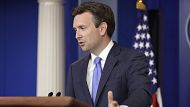At the age of 14 Hicham Jansis fled Homs, a city the Syrian civil war has turned to rubble; at 16 Hicham waited in a refugee camp thinking only of water and the food he could not eat.
On Wednesday, two years after he arrived on Australian shores, he came first in his HSC course.
More World News Videos
Thousands of civilians flee Aleppo
Evacuating the rebel-held part of eastern Aleppo as the Syrian army and its allies take control of large areas in the city.
"When they called I thought it was going to be bad," he said. "When they said I came first in Arabic Extension I couldn't believe it, I stopped and said: can you say that again?"
Hicham has good reason to be wary of phone calls. On the morning of his last HSC exam he received another.
His uncle had been killed in a bomb blast in Aleppo, a city that two million people once called home, but whose civilians have since endured what the UN humanitarian spokesman has described "a complete meltdown of humanity", through starvation, airstrikes and in the last desperate days of war, summary executions.
"It's not normal to have your country at war while you are studying," Hicham said.
"You can't concentrate when your city is being bombed, when your relatives are killed or being arrested by the regime."
In 2014 after his family of seven had fled the battlefront on foot to Jordan, they found refuge in a camp on the Syrian border that provided emergency accommodation to more than 80,000 people, and where exams weren't a priority.

"School was for two hours per day," he said. "You don't think about education, the basic things you think about, food, water, money."
Just in time for year 11, when many Australian students where soaking up the last of their halcyon summer holidays, Hicham arrived in Sydney, to a new country, a new language, and a new way of interpreting the world.

"In Syria the questions were direct, there is no analysing," the Oatley Georges River College student said.
"They just memorise and then whatever you memorise you put in the exam. There is no evaluate, assess, all this stuff. Opinion is something missing in our education."

On Wednesday, Hicham, dressed in a black suit in 35 degrees, stood with his mother and father in Eveleigh's Technology Park in Sydney's inner city.
He sheepishly avoided their kisses as 123 of his peers, anointed as the best in their fields from Aboriginal Studies to Industrial Technology, mingled around them.

His father, Mukthar Jansis, was lucky to be there clutching his side.
The 50-year-old was critically wounded as they escaped from Homs. He was only saved from the brink by a medical volunteer.

"That is why I want to be a doctor," Hicham says. "When I was in Jordan and Syria there are a lot of volunteer doctors who helped the injured people, my dad was injured and only had a few minutes to be dead."
Hicham acknowledges there are hurdles to medicine. Despite coming top of the state in Arabic Extension, he is more worried about his other subjects, Maths, Chemistry, Biology and English.
"I know my ATAR won't give me the eligibility," he said. "But I will try other pathways like other undergraduate degrees."
Hicham and his family arrived just before 12,000 Syrian and Iraqi refugees were promised asylum under one of Tony Abbott's last acts as prime minister.
"Now the situation is getting worse," he said. "Today I'm so happy because of this celebration, yesterday I was crying because of the field executions that are happening in Aleppo, because of all the bombing, the air strikes."
On Wednesday, a tentative deal to evacuate the last rebel-held zones in Aleppo was reached. Hicham hopes he will be able to walk the streets of Syria once again.
"Maybe one day I will be the one to help the refugees," he said. "To help the people who have no one to help them."
But first, he wants to give back to his new home.
"You have to give something to the people who gave you everything," he said.

















